Finlay James performs my poem
And my article for The Honest Ulsterman on what I learned from watching an actor perform my work.
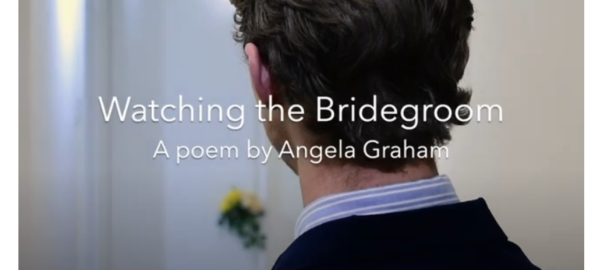
Finlay James performs my poem
And my article for The Honest Ulsterman on what I learned from watching an actor perform my work.
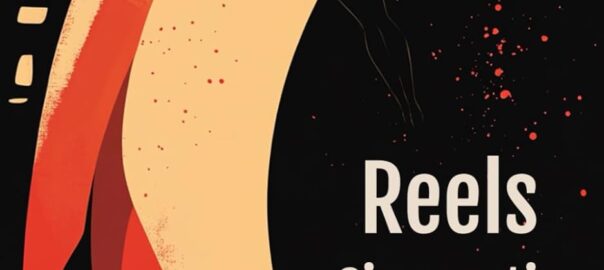

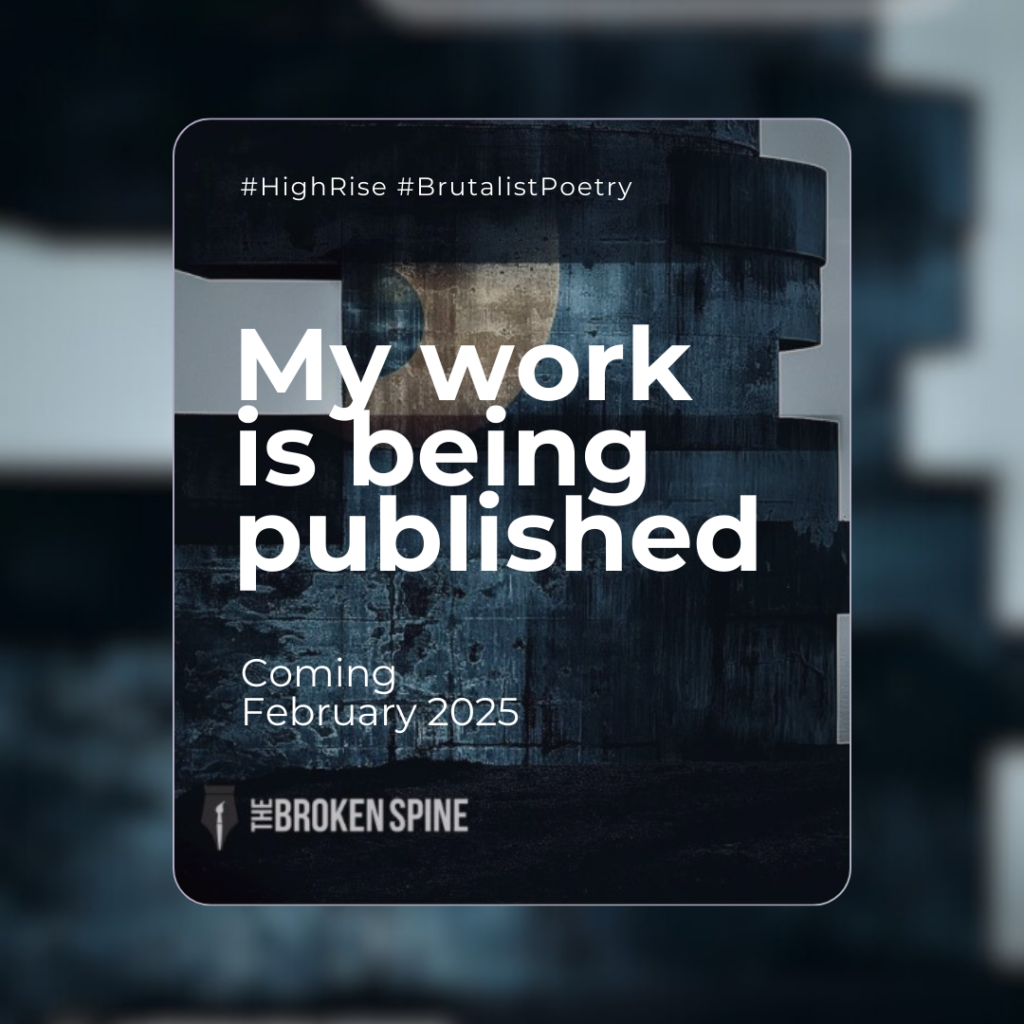
High Rise: Brutalist Poetry, a slimline anthology that promises to blend the raw, unfiltered essence of Brutalism with the emotional depth and honesty of art brut. Inspired by the architectural starkness of ‘beton brut’ and the visceral expressiveness championed by notable figures such as Charles Bukowski, Sylvia Plath, and Anne Sexton, this collection seeks to explore the profound realities of the human condition through poetry that is both honest and intricately crafted.
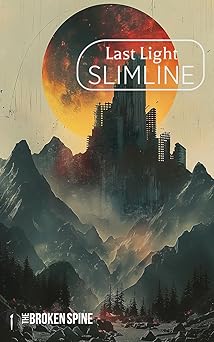
My poem ‘Ending The World’ appears in ‘LAST LIGHT’ anthology.
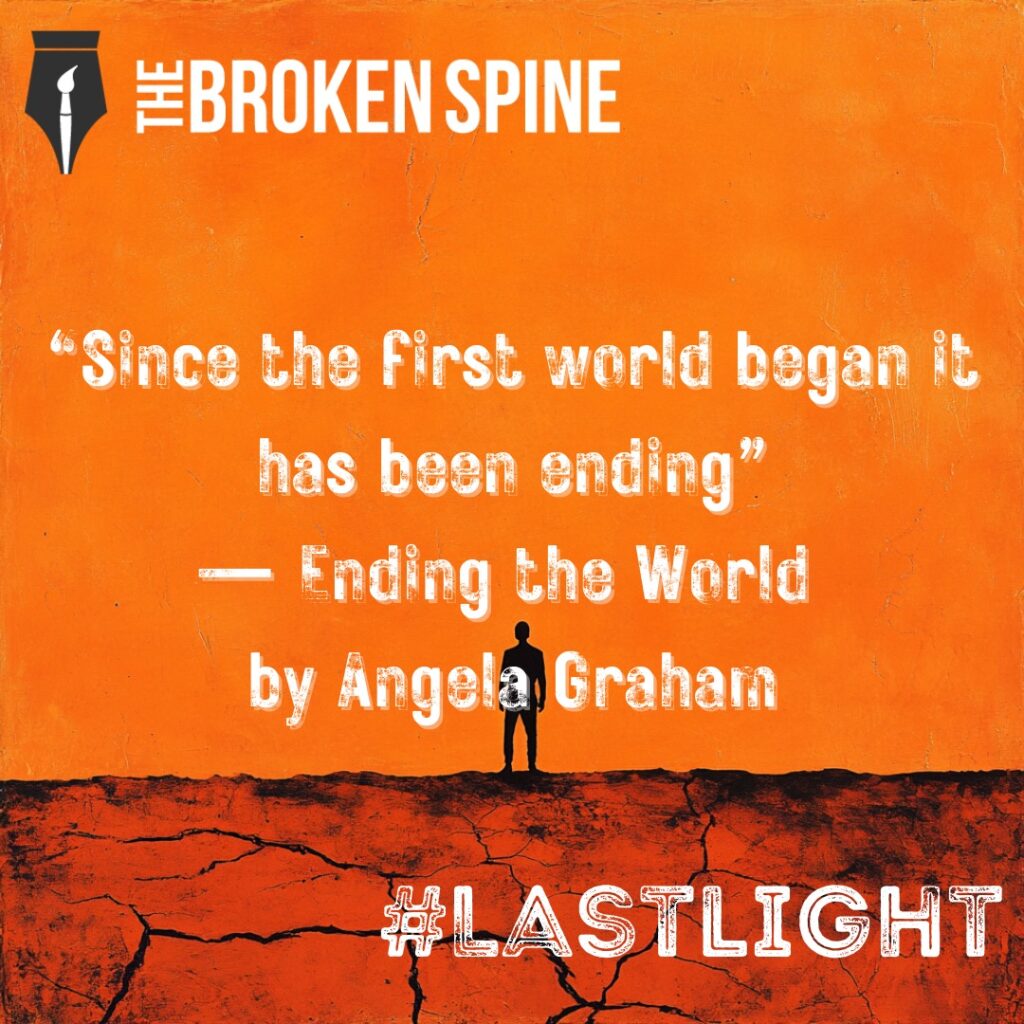
Last Light: Apocalypse Poetry is a compelling anthology edited by Alan Parry, presented by The Broken Spine. This collection offers a haunting exploration of apocalyptic themes through the eyes of diverse, contemporary poets. The works within navigate the fragility of existence, environmental collapse, and the profound sense of finality that marks the end of worlds, both imagined and real.
With contributions from poets like Angela Graham, Clive Matson, and Amaleena Damlé, each poem acts as a poignant reflection on humanity’s role in its own undoing. The collection deftly balances between the personal and the universal, capturing the myriad ways in which individuals and societies confront the spectre of annihilation. From the visceral imagery of environmental devastation to the intimate despair of personal loss, Last Light invites readers to consider the beauty and terror of endings.
Last Light is a powerful testament to the enduring relevance of apocalyptic literature in our uncertain times.
My poem, ‘CAPITULATION’ appears in ‘Reels’
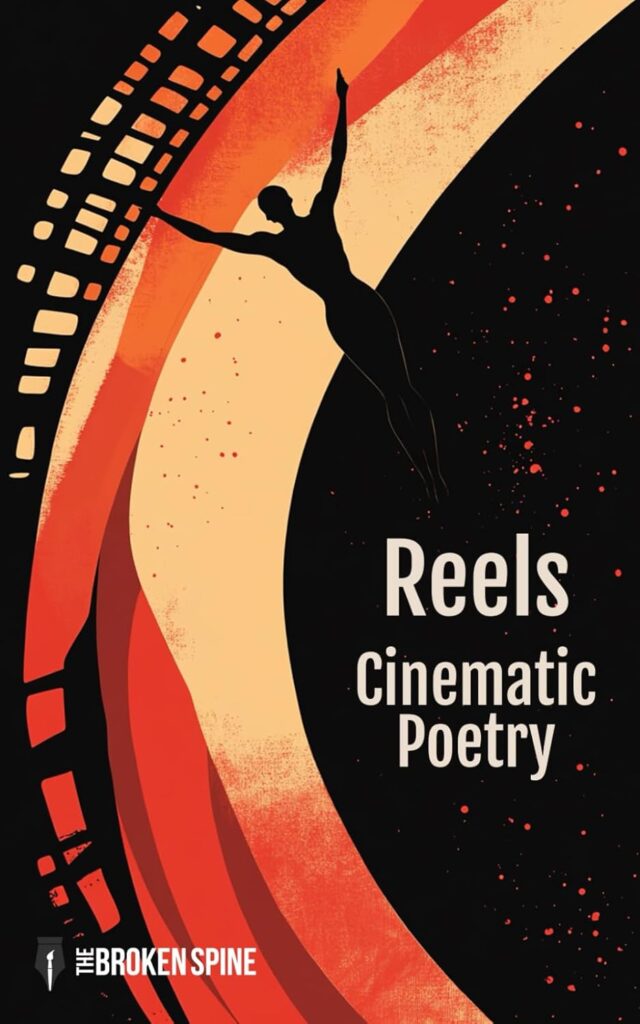
‘Reels doesn’t ask for your comfort, and it won’t offer any. This anthology gathers poets who write with an edge, crafting texts that land like unflinching film cuts, capturing moments that demand to be seen. Born from a passing conversation on the cinematic art of image-shifting, Reels is for readers ready to feel every word, every line, and every collision of light and shadow.
‘Edited by Alan Parry, Reels invites you into poetry as snapshots of raw, untamed experience. Refusing to look away, these poems confront beauty and brutality with unapologetic honesty. Featuring voices like Georgia Hilton, Sue Finch, Katie Manning, and many more—Reels embodies poetry at its most uncompromising.
Published by The Broken Spine, Reels is for those who understand that art lives on the edge, that real poetry is a lens on the world’s harshest truths. Step into these pages if you’re ready to see what these poets lay bare—but leave comfort at the door. This is poetry with teeth, capturing life’s starkest reels.’
I was interviewed about my short fiction by The Broken Spine https://thebrokenspine.co.uk/2022/11/02/brokenasides-with-angela-graham
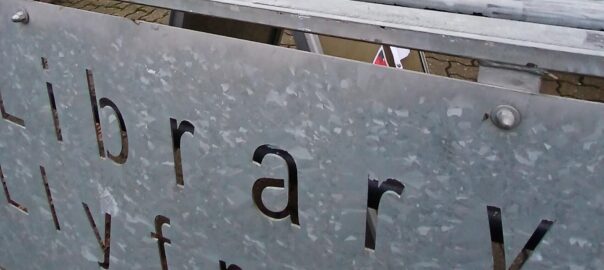
It was a particular pleasure to launch my collection, ‘STAR: poems for the Christmas Season’ at Canton library because it’s my local library in Cardiff. And even more special because some of the poems in the book are set in nearby streets. Plus, I’m honoured to be Author of the Month for Libraries Wales https://libraries.wales/aotm/angela-graham-2
Libraries have been crucial to my development as a person and as a writer. My family couldn’t afford to buy books but the local library and Belfast’s Central Library enabled me to read widely. This is a kind of nourishment and without it my childhood and adolescence would have been stinted and stunted. It’s also, by a kind of osmosis, a lesson in the benefits of sharing resources.
I had the pleasure of doing readings and workshops with ‘STAR’ in 8 libraries in Northern Ireland and, just as here in Wales, that experience showed me time and again how a library sustains a locality.
Librarians deal in more than books. They are sources of information, support and encouragement and, crucially, they help people to help each other through many kinds of groups. Everywhere I sensed the loyalty and affection people feel for their libraries.
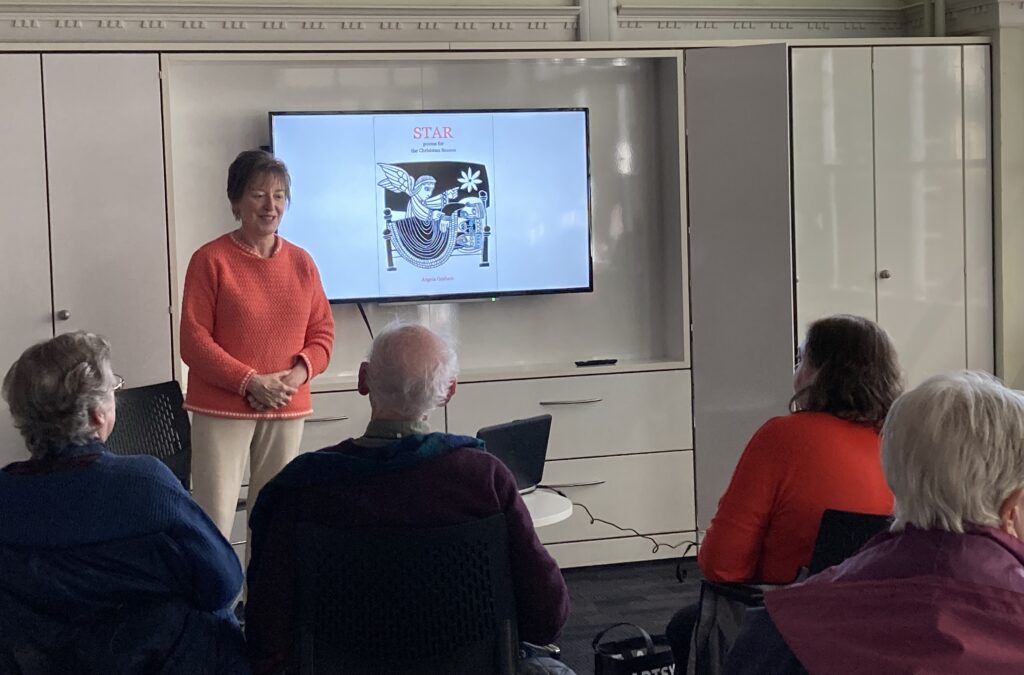
At every event people have enjoyed the images I present along with the poems. Martin Erspamer’s 15 beautiful linocuts in the book are always admired. And everyone likes the cover! I also show art works that relate to poems.
Continue reading ‘STAR’ launch at Canton Library, Cardiff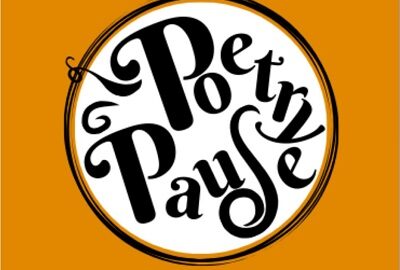
Poetry Pause is run by Emma Baines, Philippa Davies and Jean Riley near Narberth, west Wales. In Episode 7 the focus is on Carol Ann Duffy and has a powerful sonnet from Mab Jones and one from me.
Thanks @AngelaGraham8 for beautiful 'An Irish Merchant Seaman' (1st published @TheOpenEar) as guest sonnet in latest episode. Read by @crofftwerdd. pic.twitter.com/VizrrKRzB9
— poetrypausepod (@poetrypause_) October 29, 2020
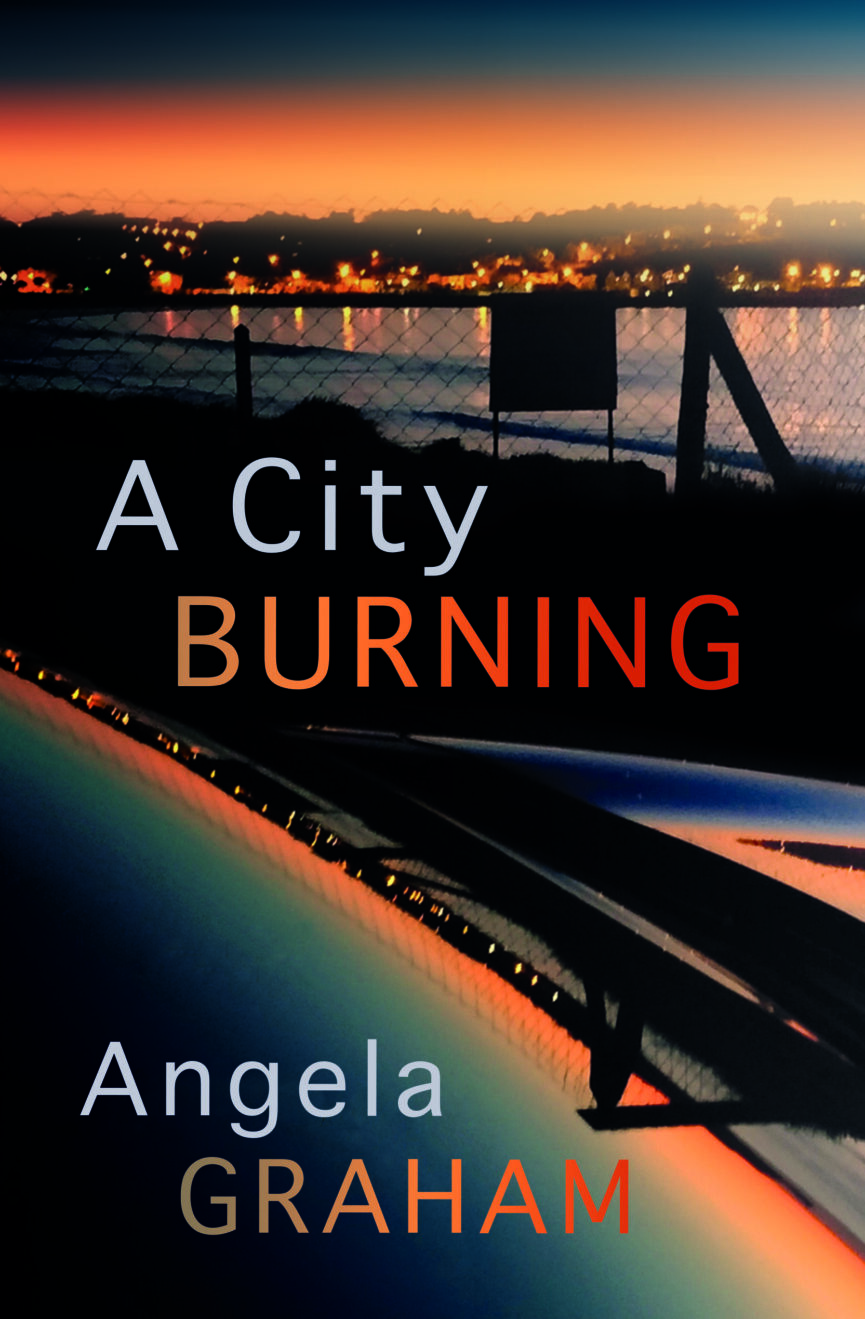
Mewn argyfwng y mae dinas yn llosgi – am fod yr hen drefn wedi methu ac mae’n rhaid i newid ddod. Mae pob gwerth, perthynas a chred yn cael ei siglo ac mae’r dyfodol yn anelwig.
Yn y chwe stori ar hugain yn A City Burning, mae plant ac oedolion yn llygadu eiliadau o drawsnewid posib yn fflamau trasiedi bersonol. Ar drothwy eu dyfodol, rhaid i bob un ddewis: sut i fyw yn y ‘nawr’ newydd hwn.
Wedi’u lleoli yng Nghymru, Gogledd Iwerddon a’r Eidal, mae’r straeon cwmpasu cyfnod yr Ail Ryfel Byd ac oes Covid-19.
Archebwch here
Wrth aros am garcharorion digalon ddod adre o’r Rhyfel, mae Eidalwr yn gweld ffordd ysgytwol i ailadeiladu ei fyd; ar arfordir Antrim, mae Gwyddel yn cael ei wthio i’r dibyn gan gythreuliaid ei deulu niwrotig; yng Nghymoedd de Cymru, helpu’r henoed yn eu cartrefi yn ystod y pandemig yw ffrwnt newydd brwydr y gweithwyr, ym mhrofiad un o’u gofalwyr. Merch yn ei harddegau yn digalonni wrth wynebu dyfodol ym myd Covid; terfysgwr mewn cariad; gweinidog dialgar; actores yn ceisio goleuni yn ei rôl i oresgyn rhwystrau ei bywyd go iawn: dyma bobol gyffredin mewn argyfwng – pob un wedi’i bortreadu â dealltwriaeth ffyrnig o anghyfiawnder a chreulondeb eu bywydau.
Ond mae’r sgwennu’n delynegol hefyd, llawn hiwmor ar brydiau ac yn craffu ar iaith ac ieithoedd – Eidaleg, Ulster Scots, Cymraeg. Yn ogystal â chymeriadau yn eu gwledydd eu hunain, rydyn ni’n cwrdd â Gwyddelod yn yr Eidal, Eidalwyr yng Nghymru, Cymry yng Ngogledd Iwerddon.
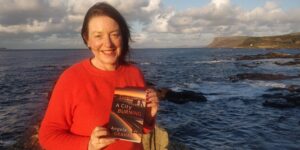
Mae gweledigaeth sinematig o ffocws a lleoliad yn sail i bopeth sy’n digwydd: siop lyfrau diflas wedi troi’n gyrchfan rhamantus gan ysbrydion y meirw; dau offeiriad ifanc mewn cegin yn y Fatican yn gwrthdaro’n serchus; nemesis yn taro – o’r awyr – mewn coridor ysbyty.
Mae gan Angela Graham greddf am fanylion arwyddocaol a chlust am ddistawrwydd llwythog; fe fydd ei straeon yn gafael yn eu darllenwyr ac yn aros yn y cof ymhell ar ôl iddynt ddod i ddiweddglo.
Gwyddeles Gymraeg sy’n wreiddiol o Belffast yw Angela Graham. Cyn ysgrifennu A City Burning roedd hi’n gynhyrchydd a chyfarwyddwr teledu ac yn awdur sgriptïau ffilm yng Nghymru. Mae hi wedi cynhyrchu mwy na 100 o raglenni dogfen a ffeithiol i S4C, BBC, ITV a Channel 4. Bu’n Gynhyrchydd Datblygu ar ‘The Story of Wales’, gyfres hanes Cymru nodedig y BBC a ennillodd gwobrwyon BAFTA Cymru. Cynhyrchodd a chyd-ysgrifennodd y ffilm sinema Gymraeg / Wyddelig ‘Branwen’ (ymgeisydd i’r Oscars yn y categori Iaith Dramor ac enillydd gwobrau rhyngwladol) ac mae hi wedi ysgrifennu sgriptiau ffilm wedi’u lleoli yn yr Eidal a Rwmania.
Mae straeon Angela Graham wedi cael eu cyhoeddi’n eang mewn sawl gwlad a’u canmol yn frwd am eu meistrolaeth o dôn a llais. Mae hi’n rhugl ei Chymraegac yn fardd arobryn.
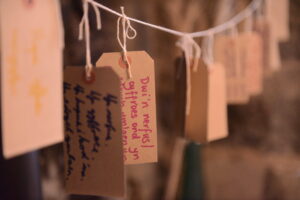
Beirniadaeth ar A City Burning:
‘Angela Graham is a brilliant new voice. This is literature that will last.’ Kate Hamer
“In this powerful collection, Angela Graham shows herself master of the angle of vision: her tales capture the mercurial moment when a person’s world is changed forever, in a road or room, against a landscape, seascape or starscape, at the graveside or (as in the towering story, ‘Life-Task’) at a forsaken railway station in the aftermath of war.” – Stevie Davies
“These stories show us what the genre does best: the ‘snapshot’ of a moment which reveals a life or a culture in a moment of transition or realisation, what James Joyce called an ‘epiphany’. … This vivid, humane and beautifully-controlled collection suggests Angela Graham is another name to watch.” – Prof Diana Wallace
“Good writing is compelling. Each of these twenty-six stories takes you out of your own skin and into the lived experience of another… The writing is sparse. Every word is telling… But there’s also lyricism, a feel for the rhythm of speech and an ability to capture natural beauty… These stories are not comfortable… but they are honest, searing, insightful and very, very good.” – Inez Lynn
‘The stories entice and intrigue…highly recommended’ – Graham Reid
‘Short, sharp and sometimes shocking, these wonderful stories truly pack a punch.’ Sue Leonard
‘an impressive kaleidoscope of landscape and language’ – Angeline King
‘A debut collection of tales remarkable for its verve, depth and range. Elegantly arranged, pellucidly told and persistently perceptive: twenty-six stories, one singular voice.’ – Jon Gower

New story on Horla site
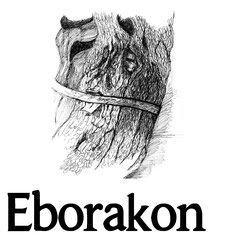
Gwyneth Lewis – Henaint / Old Age, a double pleasure in Welsh and English.
Pleasure despite excruciating pain. I find myself recommending a tormenting thrill. Gwyneth Lewis’s Welsh poem Henaint and her translation of it into English, Old Age are excellent examples of the wonderful double enjoyment that a poet working in two languages can offer. Continue reading Eborakon: Gwyneth Lewis – Henaint/Old Age
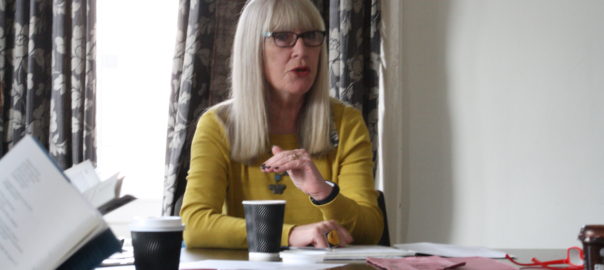
I like anything that delivers on its pitch and that was certainly the case with the Mairtín Crawford Award Workshop: Preparing Poetry For Submission, April15th at the Crescent Arts Centre, Belfast.
Continue reading Mairtín Crawford Poetry Award Workshop with Moyra Donaldson
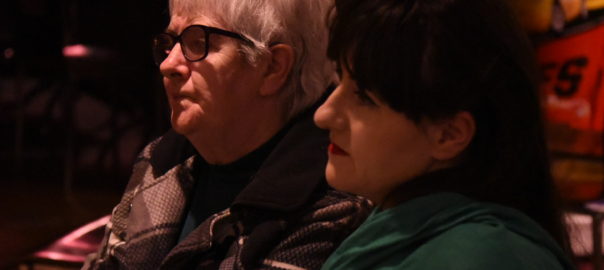
The third research trip for my novel started and ended with snow. My flight from Cardiff to Belfast was delayed by 23 inches of it near the airport and by another fall on the return but I encountered nothing other than warmth from the people I met in Northern Ireland.
It was a pleasure to spend time with teachers, schoolchildren, community workers, experts in Irish and Ulster Scots, journalists, farmers and agricultural experts. I also enjoyed two great reading gigs and came home with a prize certificate.
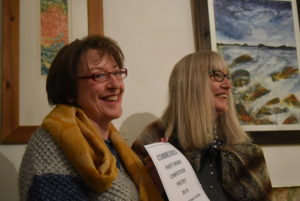
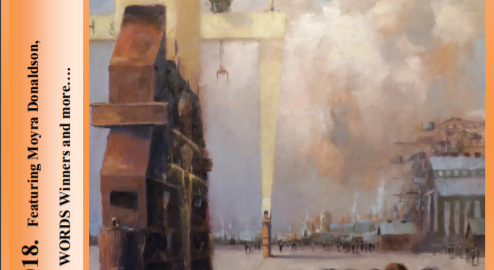
My poem View-finder made the Top Ten, ‘Commended’ in the 40 Words Competition of The Bangor Literary Journal, March 2018. Page 69